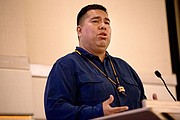Spokane River Forum talks water issues
COEUR d’ALENE — Water managers and scientists from all over North Idaho and Eastern Washington are gathered in Coeur d’Alene this week to discuss bi-state water issues and resolutions.
The Spokane River Forum kicks off this morning at The Coeur d’Alene Resort for two days of meetings covering topics ranging from water quality, water quantity and water recreation on Lake Coeur d’Alene and the Spokane River.
The conference got its unofficial start Tuesday with the Coeur d’Alene Tribe-sponsored “Our Gem Symposium.”
“(Tuesday) is the symposium with the Tribe and it’s mainly focused on the Lake Management Plan,” said Andy Dunau, executive director of the Spokane River Forum. “(Today) we will be tackling resources, water quality and quantity.”
Tuesday’s session touched on subjects like the need to collaborate on various water issues facing Washington and Idaho, Dunau said.
One panel discussed some of the latest science on Lake Coeur d’Alene and how the dissolved oxygen levels in the water could eventually affect the heavy metals in the sediment of the lake.
Another big theme that will play out during the forum is “the blue economy,” or the relationship between water quality and the economy.
Dr. Mark Solomon, with the University of Idaho MILES Project, touched on the economic relationship between water quality and property values.
Thursday’s lunch speaker, John Austin, director of the Michigan Economic Center at Prima Civitas, will also talk about the blue economy, followed by a panel discussion entitled “Blue really is the new green.”
But the conference will also get into the politics of water and the science behind those politics.
Over the years, Dunau said, the river forum has resulted in a lot of success stories, but many of the touchier issues are not going to get solved overnight.
“It’s a tough equation to solve,” Dunau said, referring to the bi-state nature of water.
Dunau said this prompted the formation of the Spokane River Forum, which is designed to bring water regulators and users together in an effort to find areas where the two states can collaborate.
“The more it changes, the more it stays the same,” he said. “It’s getting to the point where all this could come together, or completely blow apart.”
Today’s sessions will kick off with a discussion on climate change modeling for the Inland Northwest. The panel will try and address the question “what is the new normal?”
Other panels will tackle issues such as water adjudication and planning to ensure the region has plenty of water into the future.
Allyson Beall King, an assistant professor at Washington State University’s School of Environment, will try and answer “does our future include enough water?”
Some of the more prickly issues are likely to surface in discussions concerning nutrients and how they may be reacting with heavy metals in the lake sediment. Some panel members who spoke on Tuesday discussed some of the challenges they are facing, while trying to reduce the nutrient loading in the rivers and lakes of North Idaho.
They say finding the funding for those projects is proving to be difficult.
Phil Cernera, director of the Coeur d’Alene Tribe’s lake management department, said part of the frustration the Tribe has is that Superfund settlement money cannot be used on Lake Coeur d’Alene projects because the lake was specifically exempted from the Superfund listing in the 1990s.
Cernera said it may be time to reopen the Coeur d’Alene Lake Management Plan to address that.
The forum kicks off this morning at 9 and wraps up Thursday at 4:30 p.m.
For more information on the forum visit www.spokaneriver.net online.



